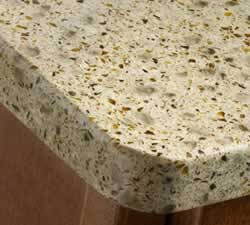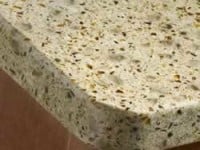Quartz takes any kitchen Countertops or bathroom countertops to the next level of attractive elegance. One of the toughest countertop materials available, quartz will deliver decades of durable service while maintaining its beauty.
One of the most appealing features of quartz kitchen and bathroom countertops is that they are available in many colors from bright to black with a spectrum in between of creams, browns and grays. This is because they can be enhanced with colo rant to produce nearly any hue you can imagine while offering the look and feel of natural stone.
rant to produce nearly any hue you can imagine while offering the look and feel of natural stone.
In this countertop guide, you’ll find information including pros and cons of quartz countertops that will help you decide if they’re the best choice for your home. It will also be helpful to see our countertop guides for granite, marble and other materials in order to compare them head to head.
What You Should Know About Quartz Countertops
Quartz countertops differ from granite and marble countertops in one significant way: quartz is an engineered product while the other two are solid stone. The composition of quartz countertops is about 93 percent quartz, a natural material found in abundance in the earth’s crust, and 7 percent binder and color.
The quartz is ground into small particles and then mixed with a polyester resin binder to hold it together and with pigment to give it richer color. Small particles of glass or reflective metallic flakes are added to some designs to achieve a unique look. The result is an attractive, extremely strong slab that is similar in appearance to marble.
In addition to lustrously polished finishes, quartz counter tops are available that duplicate the matte finish of limestone, the textured finish of granite or the gloss of highly polished stone. As an engineered product, they can be produced in far more options than natural stone countertops. When you go shopping for quartz countertops, you’ll find options to fit any design and the color scheme you’re planning.
Quartz Countertops Pros and Cons
There is plenty to like about these durable and attractive countertops, and a couple of reasons to be cautious about them. Here’s a look at the strengths and weaknesses of quartz countertops.
Quartz Countertop Advantages:
- Excellent options for color, pattern, texture and finish
- Extremely durable
- Quartz doesn’t need to be sealed while natural stone does
- It is non-porous, so resistant to staining and bacteria
- Easy to clean with a damp cloth (and mild cleaner, if necessary)
- Very hard surface is resistant to scratches
- More depth to the finish than is possible with solid-surface countertops
- The resin creates flexibility, so countertops won’t chip as easily as granite, marble, tile or concrete
- The combination of quartz dust or aggregate with a binder makes it easy to manufacture slabs of many shapes and sizes to fit your kitchen or bath design
- Seams between slabs are less visible than between slabs of concrete or natural stone
Quartz Countertop Disadvantages:
- Not as resistant to heat as concrete, tile, crushed glass or granite
- Doesn’t have the natural look as stone, since it is engineered (Note: this isn’t a “con” in the eyes of those who prefer a more contemporary look anyway)
- Quartz countertops are among the most expensive, especially for the best quality and finish
- Direct sunlight over an extended period of time will cause fading and may also produce warping or cracking
In summary, you have to pay a bit more for quartz than you would for tile, wood, laminate or some solid surface designs. Plus, you’ll need to keep a hot pad or trivet nearby for pots and pans right off the burner or out of the oven. Use blinds on windows near the countertops to protect them from sunlight.
In exchange, quartz countertops deliver outstanding durability and easy maintenance combined with superior beauty consistent with high-end kitchen and bath design. For consumers who want a premium product for their home, the strengths of quartz countertops outweigh the weaknesses.
Quartz Countertop Prices
As we’ve noted, quartz countertops cost more than many other types you might be considering for your home. However, they might also be the last counters you’ll ever need to install because of their durability and timeless good looks. Here are the factors that affect quartz countertop prices:
- The grade of the material: It is offered in several grades from builder-quality to premium
- The complexity of the countertop: The more turns and seams in the countertop and the more work required to produce the edge you want, the higher your quartz countertop estimates will be
- The skill of the installer: While a handyman with good experience might be able to handle the work, and will likely charge less, it makes sense to pay a bit more to have a certified countertops installer do the work
- The cost of living in your area
As you can see, there are several variables that, taken in combination, will determine the cost of quartz countertops for your home. The best way to find the lowest prices for quality installation is to get several countertops estimates from experienced professionals with a track record of excellence.
Here’s an overview of the material and labor costs with ranges based on the cost factors mentioned above.
- Material: $45 to $75/square foot
- Labor: $0 for DIY; $15 to $22/square foot for professional installation
- Supplies: $75 to $125 per 50 square feet of countertop for fasteners, brackets, seam material, etc.
These estimates leave you with a total quartz countertops price of approximately:
$47/square foot to $100/square foot
Quartz Countertops Cleaning, Care and Repair
Quartz kitchen and bathroom counters are among the easiest of any type to clean. Since they are crafted using polyester binder, the surface is non-porous. This means that spills can’t seep into the material and that surface dirt can be wiped away with a damp cloth or cloth and mild cleaner. The non-porous surface doesn’t harbor bacteria, so you’ll have peace of mind that it can be cleaned without scrubbing or the use of harsh chemical cleaners.
Follow these quartz countertop cleaning and care tips to keep yours looking like they were just installed:
- Wipe up spills within a few minutes, especially acidic things like tomato sauce, wine, coffee, soda and fruit juice
- Use a damp cloth or mild cleaner to remove food and dried liquid
- Avoid using harsh cleaners – only use cleaners formulated for quartz and natural stone
- Dish soap won’t harm the quartz, but with repeated use on it, the soap might leave behind a residue that dulls the luster of the quartz
- While quartz countertops are quite resistant to scratches, it is still possible to mar the surface with a very sharp knife, so it makes sense to cut elsewhere or use a cutting board
- Use a hot pad or trivet for hot pots and pans
- Allow hot hair tools to cool before placing them on the quartz surface
- Close window blinds to prevent your quartz surfaces from being in direct sunlight for extended periods of time
Your countertops will come with manufacturer’s instructions for their care and cleaning. Be sure to follow them closely for best results. Quartz, as we’ve said, is very durable. As long you follow these quartz countertop care tips, your countertops will remain in great condition.
It is rare for quartz surfaces to chip since quartz is next in hardness to diamond. However, if yours do chip or scratch, there are easy-to-use quartz chip repair kits and coloring that provide the tools to make a repair that is nearly invisible.
Quartz Countertops DIY Installation
Hiring a professional to install your quartz countertops is always a good idea. Improperly installed counters can come loose or be subject to stresses that will make them crack.
The more complex the shape of the countertops and the more seams involved, the more important it is for the installer to have god experience with this material. On simple, one-piece countertops, DIY installation might be possible, but you should have good experience and the right tools to tackle the work.
Keep in mind that with DIY installation, the potential savings and satisfaction must be weighed against the risk of damaging the material and having to cover the cost of repair or replacement. Since the majority of the cost is in the material versus the labor, it might make sense to get several quartz countertop installation estimates to consider.
Are Quartz Countertops Right for Your Home?
Consider these questions as you evaluate quartz alongside the other materials you’re considering.
- Is the higher cost of premium quartz in the budget? While there are discount grades of quartz offered by some manufacturers, you’ll get the best looks and performance from high-quality quartz countertops made by DuPont, Silestone, Caesarstone, Cambria and other top brands.
- Is a move in your near future? You’ll get the best value from quartz countertops if you plan to stay in your current home for 10 years or more. If you move, the quartz will make your home more appealing, but you might not recoup the total cost in the form of a higher sale price.
- Are you willing to pay more for countertops that are very low-maintenance and extremely durable? If so, you can’t go wrong with quartz. Clean-up time and effort are minimal.
- Do you have kids that leave a mess behind in the kitchen? Where this is common, quartz is a better choice than granite or marble, both of which are susceptible to staining. Quartz is very stain-resistant.

